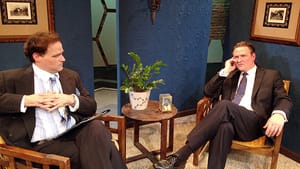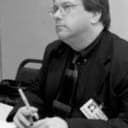Stay in the Loop
BSR publishes on a weekly schedule, with an email newsletter every Wednesday and Thursday morning. There’s no paywall, and subscribing is always free.
Nixon meets his match
New City Stage’s ‘Frost/Nixon’

Two TV screens— at first hardly noticeable, lost in darkness— flank the stage in New City Stage Company's current production of Frost/Nixon. But by the time Dan Olmstead as Richard Nixon takes his seat at the Oval Office desk at stage center, you realize the screens are far more than mere scenery, and the boxy wooden TV cameras on stage are more than mere props. The screens come alive with different angles on Nixon as he joshes with the TV crew and then delivers his resignation speech.
That's eerily appropriate, because ultimately Peter Morgan's play isn't about Richard Nixon, Watergate or the epic 1977 David Frost interviews that gave America a peek behind the Nixonian facade of self-justification and moral failure. As this masterful production makes clear, Frost/Nixon is really about television: how, as the journalist James Reston notes in the play, it simplifies and diminishes "great complex ideas, tranches of time, whole careers” so that they’re “reduced to a single snapshot."
But TV can create and perpetuate power, fame, and influence just as surely as it can destroy them. Nixon's infamous five o'clock shadow might have cost him the 1960 presidential election, but by the 1977 interviews he'd more than learned how TV can also be used to lie, obfuscate and pander, whether through saccharine homilies about his mother or incredible rationalizations about the bombing of Cambodia. Those lessons are undone when, in the person of David Frost (Russ Widdall), Nixon finds himself pitted against an adversary who understands with even greater subtlety and depth the differences and similarities between politics and show biz.
Better on stage
Though I'd previously read the published play (and reviewed Ron Howard's underrated 2008 film adaptation for BSR), this was the first time I'd seen it on stage. And despite my great admiration for the film, the New City production somehow renders the work even more effective and penetrating, both dramatically and thematically.
On the stage, Frost/Nixon runs continuously without any breaks, unfolding in short, focused scenes and moving deftly among different times and locations. Some reviewers have criticized the play on that basis, finding Morgan's approach too facile and superficial— too "TV-like." But they miss the point. By conceiving the work in such a way, Morgan conveys his thesis not simply through the text but on a deeper structural level. The intense and immediate focus of the stage, especially in such a crisply-paced production, enhances Morgan's notion of truth reduced to a series of TV sound bytes— an idea that tends to be lost in the lush, more distanced medium of film.
By placing actual TV cameras on stage, director Aaron Cromie also opens up an entirely new level of the work, letting us watch the pivotal interview scenes both live on stage and also on TV, one camera trained on Frost, the other on Nixon. We can see for ourselves the images vs. the reality, Nixon's slick lies and evasions against Frost's early fumbling and later determined probing. We're forced to choose where to direct our attentions— and, uncomfortably, whom to believe and trust.
History or fiction?
The performances in New City Stage's production are all first-rate. Both Olmstead as Nixon and Widdall as Frost face the demanding task of avoiding caricature or merely echoing the definitive stage and screen performances of Frank Langella and Michael Sheen, and they succeed admirably, making the roles their own. J Hernandez as Jim Reston, Sam Sherburne as Bob Zelnick, Tim Dugan as John Birt and Marissa Bescript as Caroline Cushing are convincing in their roles as, in turn, assistants, foils, and supporters of Frost. So is Jered McLenigan as Nixon’s stalwart aide, Jack Brennan. David Bardeen does a marvelous turn as Swifty Lazar, the legendary Hollywood super-agent who never lets a check get too far from his grasp.
Though author Peter Morgan certainly did his research, interviewing most of the historical participants in person, he mentions in the play's notes that "I feel most comfortable thinking of this as a fiction, a creation... a play, not a historical document." In the hands of the New City Stage Company, Frost/Nixon is definitely not a dry historical document. It's a mesmerizing, darkly funny and yet somehow tragic look at the pervasive power of media— for good and ill, to create and destroy.
What, When, Where
Frost Nixon. By Peter Morgan; Aaron Cromie directed. New City Stage production through January 5, 2014 at the Adrienne Theatre second stage, 2030 Sansom St. (215) 563-7500 or www.newcitystage.org.
Sign up for our newsletter
All of the week's new articles, all in one place. Sign up for the free weekly BSR newsletters, and don't miss a conversation.
 Mark Wolverton
Mark Wolverton